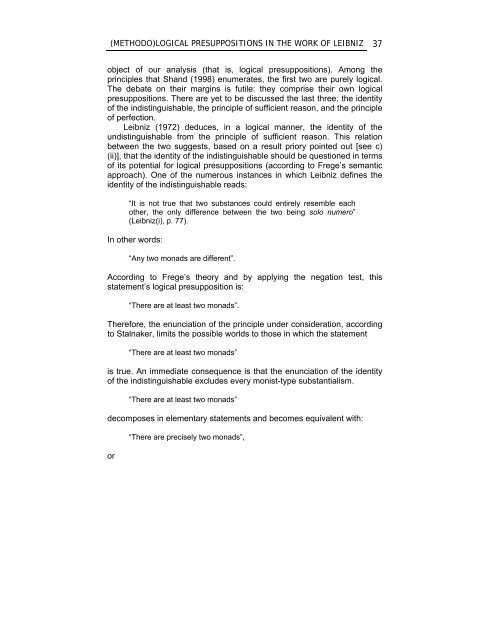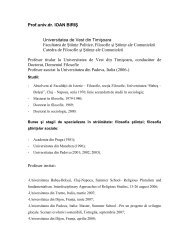analele universităţii de vest din timişoara annales universitatis ...
analele universităţii de vest din timişoara annales universitatis ...
analele universităţii de vest din timişoara annales universitatis ...
You also want an ePaper? Increase the reach of your titles
YUMPU automatically turns print PDFs into web optimized ePapers that Google loves.
(METHODO)LOGICAL PRESUPPOSITIONS IN THE WORK OF LEIBNIZ 37<br />
object of our analysis (that is, logical presuppositions). Among the<br />
principles that Shand (1998) enumerates, the first two are purely logical.<br />
The <strong>de</strong>bate on their margins is futile: they comprise their own logical<br />
presuppositions. There are yet to be discussed the last three: the i<strong>de</strong>ntity<br />
of the indistinguishable, the principle of sufficient reason, and the principle<br />
of perfection.<br />
Leibniz (1972) <strong>de</strong>duces, in a logical manner, the i<strong>de</strong>ntity of the<br />
undistinguishable from the principle of sufficient reason. This relation<br />
between the two suggests, based on a result priory pointed out [see c)<br />
(ii)], that the i<strong>de</strong>ntity of the indistinguishable should be questioned in terms<br />
of its potential for logical presuppositions (accor<strong>din</strong>g to Frege’s semantic<br />
approach). One of the numerous instances in which Leibniz <strong>de</strong>fines the<br />
i<strong>de</strong>ntity of the indistinguishable reads:<br />
“It is not true that two substances could entirely resemble each<br />
other, the only difference between the two being solo numero”<br />
(Leibniz(i), p. 77).<br />
In other words:<br />
“Any two monads are different”.<br />
Accor<strong>din</strong>g to Frege’s theory and by applying the negation test, this<br />
statement’s logical presupposition is:<br />
“There are at least two monads”.<br />
Therefore, the enunciation of the principle un<strong>de</strong>r consi<strong>de</strong>ration, accor<strong>din</strong>g<br />
to Stalnaker, limits the possible worlds to those in which the statement<br />
“There are at least two monads”<br />
is true. An immediate consequence is that the enunciation of the i<strong>de</strong>ntity<br />
of the indistinguishable exclu<strong>de</strong>s every monist-type substantialism.<br />
“There are at least two monads”<br />
<strong>de</strong>composes in elementary statements and becomes equivalent with:<br />
or<br />
“There are precisely two monads”,




